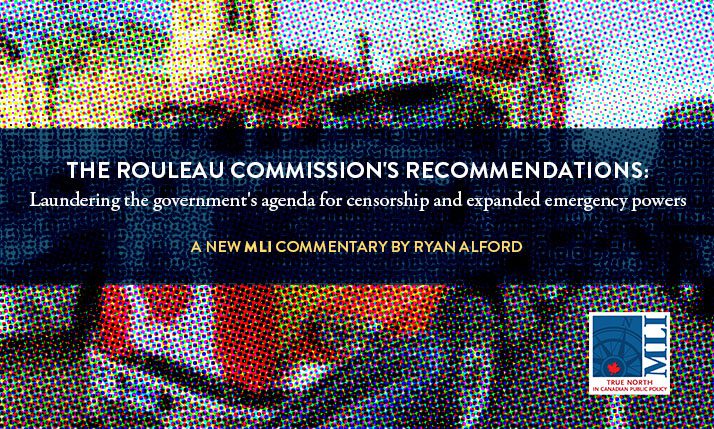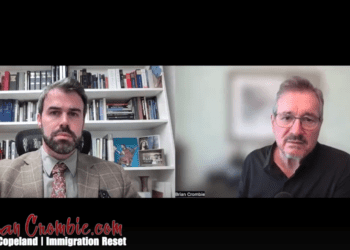By Ryan Alford
October 12, 2023
On August 31, Minister of Public Safety Dominic LeBlanc issued a six month progress report on implementing the recommendations of the Public Order Emergency Commission (POEC), also known as the Rouleau Inquiry. It is notable for what it explicitly notes as being implemented, and for what remains to be implemented without significant comment. That said, it would be an error to begin with a comparison between what the Final Report of the Rouleau Inquiry recommended and what the federal government is now implementing. Rather, the critical point of comparison is between the Order-in-Council establishing the Commission – that is, Commissioner Rouleau’s marching orders from the Government – and the legislative agenda that is now being pursued.
The Emergencies Act itself calls for a mandatory public inquiry into “the circumstances that led to the declaration [of an emergency] being issued and the measures taken for dealing with the emergency.” Before the POEC, civil
libertarians had understood this to mean that the mandate of any inquiry would be to examine whether the government had a reasonable basis to conclude threats existed to national security that could not be dealt with under any other Canadian law, and whether the emergency measures taken by the cabinet conformed to the Canadian Charter of Rights and Freedoms. In short, it was always assumed the Inquiry would have a tight focus on whether a national emergency, as defined by law, existed and whether the declaration (and every action taken under it) had been constitutional.
That reassuring assumption proved unfounded. In the Order of April 25, 2022, the Governor General in Council, on the recommendation of the Prime Minister, redefined the meaning of the “circumstances that led to the emergency”, which now included “the impact, role and sources of misinformation and disinformation, including the use of social media”. It also directed the Commissioner to “make recommendations, as pertains to the matters examined in the Public Inquiry, on the use or any necessary modernization of [the Emergencies] Act”.
Thus, cabinet dictated the fundamental assumptions that guided the Rouleau Commission. Two of these assumptions stand out from the others. First, that misinformation and disinformation on social media had a significant impact on the organizers and participants of the Freedom Convoy. Second, that the Emergencies Act might need “modernization”. Both of these premises are highly problematic and should not have been granted at the outset of the hearings (i.e.: prior to the admission of any evidence).
The hearings phase provided ample demonstration of the spuriousness of these assumptions. Witness testimony reiterated that the concerns of Freedom Convoy protestors were practical and political in nature. Many had been directly affected by vaccine mandates that curtailed their ability to work and travel. Others expressed the view that these mandates had expanded the powers of government beyond what was acceptable. While these might not have constituted an indisputable justification for a sustained and disruptive protest, there was no evidence presented in the hearings that the Freedom Convoy protests were predicated chiefly, or even substantially, on social media-borne misinformation or disinformation.
Second, the only testimony from witnesses that supported the notion that the Emergencies Act needs to be modernized came from those closest to the heart of the federal government, namely the National Security and Intelligence Advisor to the Prime Minister and the Clerk and Deputy Clerk of the Privy Council Office (PCO). The documents, chiefly emails, expressing their concerns about the purportedly antiquated requirements for declaring a public order emergency seemed to follow shortly after the Director of CSIS had circulated a memorandum conveying his opinion that these requirements had not been met.
Essentially, when the request to conclude that a public order emergency existed had been rebuffed by CSIS, the RCMP, and, most critically, the Intelligence Bureau of the Ontario Provincial Police, which was at the time coordinating on the ground intelligence collection, senior government bureaucrats started to express concern that the Emergencies Act and the CSIS Act were out of date.
Many observers found this claim unconvincing; not least because, unlike many pieces of public safety-related legislation – for instance, the Criminal Code – neither the Emergencies Act or the CSIS Act had been previously flagged as in need of updating as both are relatively modern pieces of legislation, enacted in 1988 and 1984, respectively. Notably, these laws themselves had been passed in response to the serious abuse of the War Measures Act during the October Crisis of 1970 and, in the decade that followed, the unlawful activities of the
National Security Division of the RCMP, as detailed in the final report of the McDonald Commission (1981).
Accordingly, it was not surprising that, in the three decades since the enactment of these two laws, there had been no amendments that would have loosened the legislated restrictions on federal government’s ability to expand its own powers at the expense of Parliament and the provinces. The Order-in-Council nevertheless mandated that the Inquiry consider the issue of the “necessary modernization” of the Emergencies Act, and the Commission continued to take this directive seriously – even after it had become apparent that the argument that modernization was needed had originated in an internal dispute over whether a declaration of a public order emergency during the Freedom Convoy would be unlawful. (All of the police and intelligence agencies consulted by the government had concluded that the statutory and constitutional requirements for the use of the Emergencies Act had not been met).
What is even more problematic is the possibility that Cabinet had made the call to invoke the Emergencies Act on the premise that it was appropriate to measure the facts on the ground in Ottawa against the standard of an “evolved” interpretation of the Act (likely at the urging of senior bureaucrats). This may well have been the same logic employed by Minister of Justice David Lametti. We’ll likely never know for sure, owing to the Prime Minister’s assertion of solicitor-client privilege over a secret memo outlining the Justice Department’s legal argument for invoking the Act, which convinced the Cabinet to come to the opposite conclusion from the one stated in the Director of CSIS’ memorandum of the previous day.
Accordingly, by directing the Rouleau Commission to consider whether the Emergencies Act needed to be modernized, the Cabinet may have been clandestinely requesting that the Inquiry bless its novel (and secret) interpretation of legal definition of a public order emergency. This interpretation would, as such, receive a retroactive justification if the Commission were to conclude that the Minister of Justice had merely been anticipating the legislative changes needed to modernize the Act.
For obvious reasons, this request could not be made explicitly. If the Cabinet did, in fact, rely on the “evolved” definition in a closed-door meeting protected by Cabinet and solicitor-client privilege, this would be a constitutional abomination they’d rather not see come to light. The Emergencies Act specifies a narrow range of conditions that allow the Cabinet to assume the power of Parliament to pass laws – a problematic exemption from the basic principles of responsible government at best. If the Cabinet decided to surreptitiously amend the legislation that allows it to invoke these extra-parliamentary powers, it is effectively asserting the supremacy of the executive over the legislative branch. Cabinet cannot be confined within legal bounds if it reserves for itself a secret power to adjust these bounds outwards at will.
The second assumption embedded in the POEC’s mandate received more explicit treatment in LeBlanc’s progress report. It noted that the Final Report had charged the government with addressing “social media misinformation and disinformation”, and that the Commission had made specific recommendations that “the federal government work with its partners to further study the impact of social media . . . while addressing the serious challenges that misinformation, disinformation, and other online harms present to individuals and Canadian society”. Suffice it to say that Minister LeBlanc’s progress report makes it clear that this particular recommendation is being taken very seriously.
Of course, when the Cabinet directed the Rouleau Commission to provide recommendations related to social media misinformation, it had already reached firm conclusions about the need to implement far-reaching censorship of online expression. However, in purporting to merely be implementing the recommendations of a Public Inquiry, the federal government may be able to divert attention from the fact that some of the most contentious elements of this legislation have already been passed. This includes provisions that would allow the a committee established under the CRTC’s regulatory authority to assess and censor individuals’ social media posts. Additionally, it can point to the recommendations of the Rouleau Commission as a justification for the decision to funnel still more governmental funding to purportedly “neutral” civil society organizations and academic research centres that inevitably take the position that increased governmental censorship is necessary and justifiable. (See, for instance, Ontario Tech University’s Centre on Hate, Bias, and Extremism).
Indeed, this dynamic of finding purportedly neutral sources for highly contentious proposals was present within the Rouleau Commission itself. Having failed to obtain testimony that demonstrated the need for censorship and increased emergency powers in the Inquiry’s evidence phase, the Inquiry’s in-house Research Council commissioned (and paid for) submissions from a number of academics well-known for their advocacy, some of whom were affiliated with and even co-authored their submissions with notoriously politicized and ideologically biased organizations, such as the Canadian AntiHate Network.
Finally, when it came time for the culmination of the policy phase of the Inquiry, the roundtables charged with shaping the Commission’s recommendations were packed with experts with ties to the Trudeau government, notably exTrudeau Foundation CEO Morris Rosenberg. (Rosenberg was also the author of the report commissioned by the Privy Council Office that concluded that foreign interference had not affected the 2021 federal election; Rosenberg’s report concluded, contentiously, that “domestic actors” should also be a subject
of concern.)
On the question of whether the government will propose amending the Emergencies Act, LeBlanc’s progress report is considerably more evasive. This is likely because detaching the definition of a public order emergency from the definition found in the CSIS Act, as Rouleau recommended, would dramatically expand the federal government’s power to declare an emergency. If the legislative amendment tracks the Cabinet’s desires, the Emergencies Act could be triggered by any activity that threatens the “economic security” of Canada. As the more critical policy experts noted at the roundtable (and in their policy recommendations), this definition is practically limitless, as any disruptive protest (or strike, lockout, mass gathering, boycott, etc.) could have an “impact” on the national economy.
Accordingly, it seems likely that, before proposing such an amendment, the government will want to gauge the prevailing winds in Parliament. The surest indicator of unfavourable conditions would be the rigorous assessment of the Special Joint Committee on the Declaration of Emergency, which has equal status under the Emergencies Act with the Public Inquiry, and should not feel any need to defer to its findings – particularly as the Rouleau Commission’s personnel, agenda, and fundamental assumptions were all determined by Cabinet, the very body whose actions it was charged with assessing.
The Special Joint Parliamentary Committee can serve as a neutral judge, and it should exercise independent judgment when compiling its own definitive report. The Committee will be an especially important arbiter of the key issue of whether the federal government, having expanded the scope of its emergency powers in secret, should receive retroactive benediction in the form of a newly amended Emergencies Act, which would encompass responses to “economic threats” (an illusory limitation, to be clear). Such an outcome would make Cabinet, and effectively the Prime Minister, our true sovereign.
About the author
Ryan Alford is a Senior Fellow of the Macdonald-Laurier Institute, a Professor at the Bora Laskin Faculty of Law at
Lakehead University, and a Bencher of the Law Society of Ontario. He was also granted the status of a Party by the Public Order Emergency Commission and appeared in that capacity before the Rouleau Inquiry.






